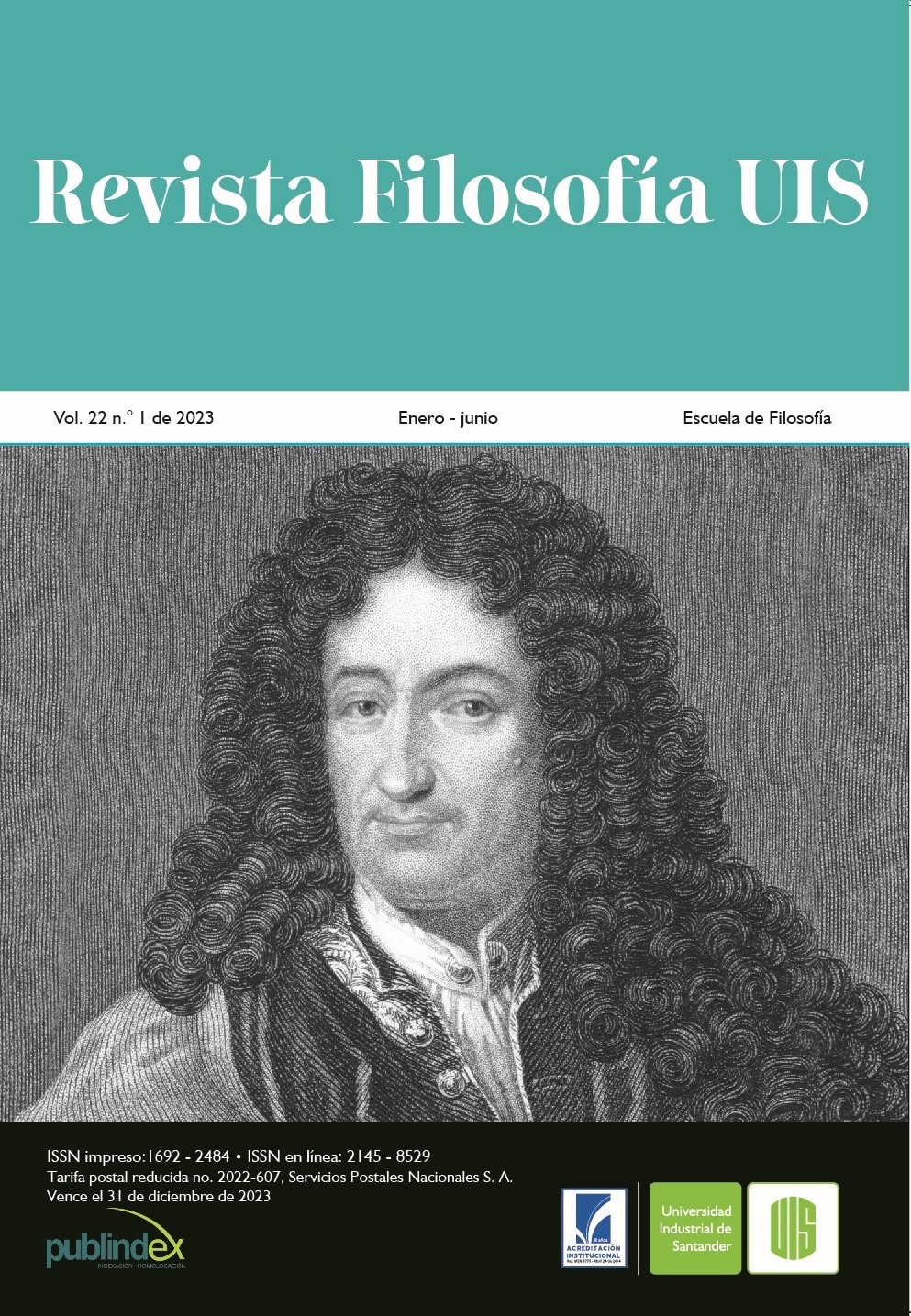Reflective Judgment and Kantian Republicanism: Ideas for Thinking the Political Beyond Revolution, Dogmatism or Traditionalism
Published 2023-01-02
Keywords
- Kant,
- political philosophy,
- republicanism,
- reflective judgment,
- humanity
How to Cite
Copyright (c) 2023 Revista Filosofía UIS

This work is licensed under a Creative Commons Attribution 4.0 International License.
Abstract
This work of reflection and research goes to the very source of Kantian political thought to show how his republican conception is based on what he calls the reflective use of reason. For this purpose, it has been divided into three parts: In the first, it will be pointed out how Kantian political thought is not based on the theoretical or practical use of reason but on its reflective use, while at the same time pointing out its characteristics. In the second, Kantian political philosophical thought will be developed, taking as an articulating axis his idea of republicanism of a people of demons. And, finally, in the third, it will be shown how, from his reflective conception, a political action in the contemporary world can be thought of, insinuating his opposition to any revolutionary, dogmatic traditionalist or moralistic thought, which does not consider the "structural" limits of the particular moral capacity of human beings.
Downloads
References
- Arendt, H. (1992). Lectures on Kant’s Political Philosophy. The University of Chicago Press.
- Berlin, I. (2017). Sobre la libertad. (A. Rivero, B. Urrutia Domínguez y N. Rodríguez Salmones, trads.). Alianza Editorial.
- Castillo, M. (2016). Cómo, según Kant, la guerra contradice el realismo político. En R. Orden, J. Navarro Cordón y R. Rovira, (Eds.), Kant en nuestro tiempo. Las realidades en que habitamos (pp. 243-252). Biblioteca Nueva.
- Dörflinger, B. (2016). La crítica kantiana de los sentimientos religiosos. En R. Orden, J. Navarro Cordón y R. Rovira, (Eds.), Kant en nuestro tiempo. Las realidades en que habitamos (pp. 321-336). Biblioteca Nueva.
- Haag, J. (2019). Darstellungen der Zweckmäigkeit in Kants Kritik der Urteilskraft. En P. Órdenes y A. Pickhan (Eds.), Teleologische Reflexion in Kants Philosophie (pp. 167-190). Springer VS.
- Herrera, W. (2016). Kant y la Revolución. En R. Orden, J. Navarro Cordón y R. Rovira (Eds.), Kant en nuestro tiempo. Las realidades en que habitamos (pp. 303-318). Biblioteca Nueva.
- Kant, I. (1966). Kritik der reinen Vernunft. In: Weischedel, W. (Hrsg.), Immanuel Kant: Werke in sechs Bänden. Band II. Kritik der reinen Vernunft (pp. 31-50). Wissenschaftliche Buchgesellschaft Darmstadt.
- Kant, I. (1975). Kritik der Urteilskraft und Schriften zur Naturphilosophie. In: Weischedel, W. (Hrsg.), Immanuel Kant: Werke in sechs Bänden. Schriften zur Anthropologie, Geschichtphilosophie, Politik und Pädagogik (pp. 31-50). Wissenschaftliche Buchgesellschaft Darmstadt.
- Kant, I. (1983a). Idee zu einer allgemeinen Geschichte in weltbürgerlichen Absicht. In: Weischedel, W. (Hrsg.), Immanuel Kant: Werke in sechs Bänden. Band VI. Schriften zur Anthropologie, Geschichtphilosophie, Politik und Pädagogik (pp. 31-50). Wissenschaftliche Buchgesellschaft Darmstadt.
- Kant, I. (1983b). Zum ewigen Frieden. Ein philosophischer Entwurf. In: Weischedel, W. (Hrsg.), Immanuel Kant: Werke in sechs Bänden. Band VI. Schriften zur Anthropologie, Geschichtphilosophie, Politik und Pädagogik (pp. 191-251). Wissenschaftliche Buchgesellschaft Darmstadt.
- Kant, I. (1983c). Beantwotung der Frage: Was ist Aufklärung? In: Weischedel, W. (Hrsg.), Immanuel Kant: Werke in sechs Bänden. Band VI. Schriften zur Anthropologie, Geschichtphilosophie, Politik und Pädagogik (pp. 51-61). Wissenschaftliche Buchgesellschaft Darmstadt.
- Kant, I. (1994). Ideas para una historia universal en clave cosmopolita y otros escritos sobre Filosofía de la Historia. (C. Roldán y R. Rodríguez, trads.). Tecnos.
- Kant, I. (1998a). Sobre la paz perpetua. (J. Abellán, trad.). Tecnos.
- Kant, I. (1998b). ¿Qué es la Ilustración? En E. Ímaz (Ed. y trad.), Filosofía de la historia (pp. 25-37). Fondo de Cultura Económica.
- Kant, I. (1998c). Si el género humano se halla en progreso constante hacia mejor. En E. Ímaz (Ed. y trad.), Filosofía de la historia (pp. 95-112). Fondo de Cultura Económica.
- Kant, I. (2006a). Crítica de la facultad de juzgar. (P. Oyarzún, trad.). Monte Ávila Editores.
- Kant, I. (2006b). Crítica de la razón pura. (P. Ribas, trad.). Taurus.
- Klein, J. T. (2013). Die Weltgeschichte im Kontext der Kritik der Urteilskraft. Kant - Studien; Philosophische Zeitschrift, 104, (2), 188-212.
- Silva, A. (2003). I. Kant: Educación y emancipación. Ediciones UIS.
- Niesen, P. (2001). Volk-von-Teufeln-Republikanismus. Zur Frage nach den moralischen Ressourcen der liberalen Demokratie. En L. Wingert y K. Günther (Eds.), Die Öffentlichkeit der Vernunft und die Vernunft der Öffentlichkeit (pp. 568-604). Suhrkamp.
- Noble-Malabed, R. (2015). “The political philosophy that Kant did not write”: The Potential for Politics and Political Community in Kant’s Third Critique. Budhi: A Journal of Ideas and Culture, 19(2-3), 44-77. https://ajol.ateneo.edu/budhi/articles/141/1633
- Santozki, U. (2005). Kants Technik der Natur in der Kritik der Urteilskraft: Eine Studie zur Herkunft und Bedeutung einer Wortverbindung. Archiv für Begriffsgeschichte, (47), 89-121.
- Serrano, E. (2004). La insociable sociabilidad. El lugar y la función del derecho y la política en la filosofía práctica kantiana. Anthropos.
- Vera-Díaz, A. (2019). Sobre el Derecho a la Resistencia en Immanuel Kant. Revista Filosofía UIS, 18(2), 17-34. https://doi.org/10.18273/revfil.v18n2-2019002

